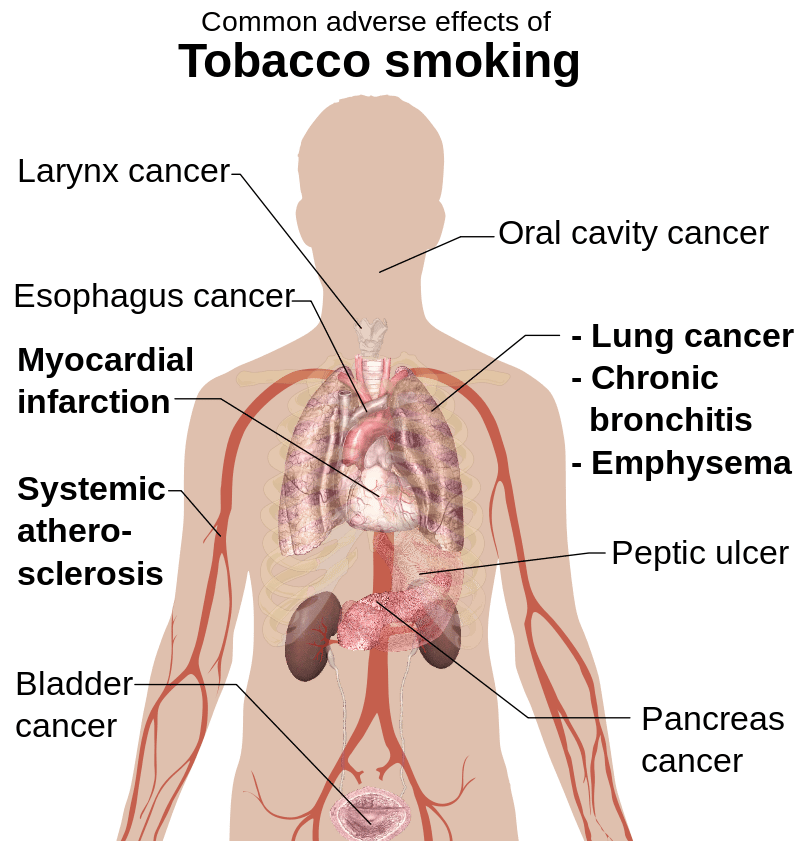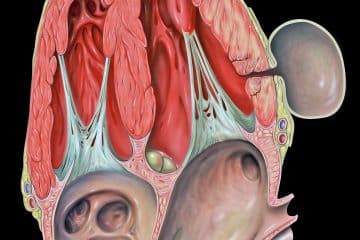List of Diseases Caused By Smoking
Smoking is a practice in which a substance is burned and the resulting smoke is breathed in to be tasted and absorbed into the bloodstream.
Tobacco is the most common substance smoked. Smoking implements include cigarettes, pipes, cigars, hookahs and bongs.
Smoking generally has negative health effects, because smoke inhalation inherently poses challenges to various physiologic processes such as respiration.

Diseases caused by smoking have been shown to kill 1 in 2 long-term smokers making smoking the biggest cause of preventable deaths in the world.
Smoking affects almost all the body organs negatively thereby leading to various organic diseases.
Some of the diseases caused by smoking include:
1. Cancer
The smoke from tobacco elicits carcinogenic effects on the tissues of the body that are exposed to the smoke. Hence, smoking is the number one cause of lung cancer.
Other forms of cancer caused by smoking include mouth cancer, esophageal cancer, pancreatic cancer and bladder cancer.
In women, smoking doubled the risk of developing cervical cancer.
More: Surgery For Lung Cancer
2. Chronic obstructive pulmonary disease (COPD)
Smoking is the cause of 9 in 10 COPD-related deaths. COPD refers to a group of lung diseases that block airflow and make it difficult to breathe.
Emphysema and chronic bronchitis are the most common conditions that makeup COPD. Damage to the lungs from COPD can’t be reversed.
Symptoms include shortness of breath, wheezing or a chronic cough.
3. Heart Disease
Smoking is a major risk factor for heart attacks and other heart diseases. Smoking causes the poisons from tar in cigarettes to enter the bloodstream.
These poisons in the blood make the blood thicker, increase the chances of clot formation. This leads to increase blood pressure and heart rate, making the heart work harder than normal.
More: Heart Transplant Facts
4. Stroke
Smoking doubles the risk of stroke. A stroke occurs when the blood supply to part of your brain is interrupted or reduced, preventing brain tissue from getting oxygen and nutrients.
As smoking reduces blood supply to all the organs of the body including the brain, smoking is a major risk factor for stroke.
5. Crohn’s disease
Cigarette smoking increases the risk of Crohn’s disease as well as the severity of the course of the disease.
6. Type 2 Diabetes
Around 90% of diabetes cases are type 2 diabetes. The CDC says that smoking is a direct cause of type 2 diabetes. Smokers have a 30-40% increased risk of developing it.
People who develop diabetes and continue to smoke are more likely to have trouble controlling their disease, which may lead to increased chances of heart disease, ulcers, infections and amputations.
7. Erectile Dysfunction
Nicotine in cigarettes affects blood flow to the genital areas of both men and women. For men, this can cause erectile dysfunction. For women, this can result in sexual dissatisfaction by decreasing lubrication and the ability to reach orgasm. Smoking may also lower sex hormone levels in both men and women. This can lead to decreased sexual desire.
8. Blindness, Cataracts and Age-Related Macular Degeneration
Smoking can make you go blind. It damages your eyes and can result in vision loss. Age-related macular degeneration is caused by smoking. It is the leading cause of blindness in adults ages 65 and older.
9. Rheumatoid Arthritis
It has been shown that smoking increases your chances of developing rheumatoid arthritis. The Arthritis Foundation cites a study that centered on the connection between the two.
Rheumatoid arthritis causes inflammation in the joints, pain, deformities and immobility.
10. Idiopathic pulmonary fibrosis
Idiopathic pulmonary fibrosis (IPF) is a type of chronic scarring lung disease characterized by a progressive and irreversible decline in lung function.
Cigarette smoking is a common risk factor for the development of the disease.
In conclusion, quitting smoking is difficult, but your doctor can help you make a plan. Ask them for advice. There are a variety of nonprescription and prescription medications that can help you quit.
You can also turn to our smoking cessation resource center, which has advice, stories from others, and more. There are both short and long-term benefits to quitting smoking.
Since smoking affects every body system, finding a way to quit is the most important step you can take to live a longer and happier life.
More: Spinal Stenosis Surgery


